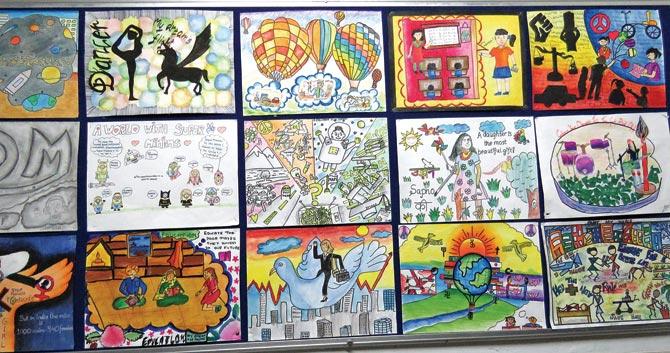Question for the day: Is one day in a year sufficient to undo hundreds of years of damage to the Earth?

Paintings by students of Gopi Birla Memorial School, Walkeshwar during a Save Aarey campaign last year
 Pre-monsoon drizzles have begun and Mumbai's schools and colleges are gearing up for admissions. Corporates, on the other hand, are ready to kick-start their tree plantations and awareness campaigns, on the occasion of World Environment Day (WED). To raise awareness about environmental issues and to encourage action to protect nature, the United Nations Environment Programme (UNEP) celebrates World Environment Day on June 5. Every year, UNEP picks a host country and a theme for the annual celebration. In 2011, India hosted WED with the theme, Forests: Nature at your Service.
Pre-monsoon drizzles have begun and Mumbai's schools and colleges are gearing up for admissions. Corporates, on the other hand, are ready to kick-start their tree plantations and awareness campaigns, on the occasion of World Environment Day (WED). To raise awareness about environmental issues and to encourage action to protect nature, the United Nations Environment Programme (UNEP) celebrates World Environment Day on June 5. Every year, UNEP picks a host country and a theme for the annual celebration. In 2011, India hosted WED with the theme, Forests: Nature at your Service.
ADVERTISEMENT
Angola hosts this year's WED, rallying around the theme of illegal trade in wildlife and related crimes which undermine economies and security, especially in developing countries. Across the globe, various NGOs, corporates and individuals put together innovative events to celebrate World Environment Day through film festivals, art and craft activities, sale of eco-friendly products and a string of competitions, exhibitions and rallies. The WED slogan poignantly points out 'Only One Earth', but the real question is — Is one day in a year sufficient to undo hundreds of years of damage to the Earth?

Paintings by students of Gopi Birla Memorial School, Walkeshwar during a Save Aarey campaign last year
My phone buzzes endlessly through mid-May all the way up to now, with calls from enthusiastic people either wanting to participate in our WED activities or from the HR departments in charge of running events to commemorate the day. It may sound harsh and cynical, but where do these people disappear during the rest of the year; failing to follow the rigours of nature conservation?
Is there a point in perfunctory WED celebrations when the company policy doesn't prevent staffers from wasting endless reams of printing paper, tissue rolls, styrofoam and thermocol and plastic cups, plates and cutlery, flex-based display banners and packed water bottles? Didn't anyone tell them about eco-friendly alternatives, such as pen-drives or e-mails, blow driers and hand sprays, biodegradable palm plates and purified water in non-disposable bottles? The use of disposable material leads to littering and deterioration of natural habitat such as lakes, rivers, creeks and hill forests via landfills, which amounts to round-the-clock damage.
The Dharavi landfill was exhausted three decades ago, while Gorai, Deonar and Mulund-Bhandup landfills, located in the middle of mangrove ecosystems, have been used beyond their capacities. We cannot continue pillaging our surroundings with tonnes of garbage emerging out of our lifestyle choices. Under such conditions, even one day per year seems like a good way to create a 'butterfly effect' with localised awareness and action programmes. Small lifestyle changes can go a long way in undoing our historical mistakes.
Some simple ideas for change are consciously segregating waste in colour-coded bins; carrying one's own shopping bag and refusing additional plastic bags; replacing bouquets with potted plants; deconcretising our residential complexes to let the Earth breathe and soak rainwater; and increasing trees, climbers, shrubs and grasses along roads.
In school buildings, one should create windowsill and community terrace gardens with butterfly attracting plants, that can work as a carbon-sink. Volunteer with an NGO, organise a clean-up drive in your vicinity or set-up an office composting unit. You can even cycle to work, join a car pool and repair old cycles to gift to tribal children. Kick-start a positive practice today for the rest of the year.
Write in to Anand at sproutsenvttrust@gmail.com
 Subscribe today by clicking the link and stay updated with the latest news!" Click here!
Subscribe today by clicking the link and stay updated with the latest news!" Click here!







